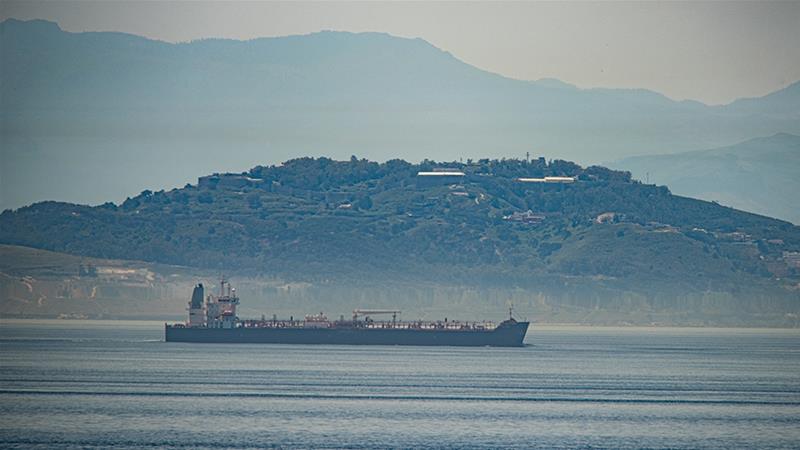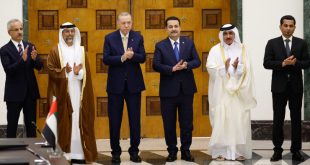But US efforts to reduce Iran’s oil exports to zero have caused Tehran to sell oil in the grey market, or by using a third country.
Despite the problems posed by sanctions on Iran’s industry and economy, Tehran has not fundamentally changed its foreign policy or missile program. However, the root of Iran’s economic problems cannot be attributed solely to sanctions.
Sanctions have enabled Iran to boost its relations with countries pursuing policies against the US. Indeed, increasing the level of cooperation with such countries has become the main priority of Iran’s foreign policy.
Recently, political contacts between Iran and Venezuela have increased, with the first of five Iranian tankers carrying much-needed gasoline and oil derivatives docking in the South American country last week. Meanwhile, flights by Iranian state-owned Mahan Air to Caracas have also increased.
This growing relationship between Tehran and Caracas has not been favourable to the United States, with Washington having boycotted both countries’ energy industries. The economies of Iran and Venezuela depend on energy exports, and both countries’ economies are in bad shape.
The status of gasoline
Venezuelan refineries have been facing erosion and a lack of investment since 2014, following falling oil prices and revenues. The country’s oil production has also quadrupled during this period to 620,000 barrels per day, while foreign debt has risen to $150 billion, double the country’s gross domestic product.
 |
US efforts to reduce Iran’s oil exports to zero have caused Tehran to sell oil in the grey market, or by using a third country |  |
In recent years, Russian oil giant Rosneft has been active in the country’s oil and gasoline distribution projects, but two of its active subsidiaries in Venezuela were sanctioned by the United States in April.
With US sanctions and falling oil prices the value of the company’s stock nearly halved, but Rosneft said it was suspending all operations in Venezuela and that the United States had lifted its sanctions against the Russian company.
Domestic consumption of Venezuelan gasoline is normally 300,000 barrels per day, but the government delivered about 170,000 barrels per day to gasoline in 2018, down from 30,000 barrels last month.
The price of state gasoline in Venezuela is the lowest in the world. Venezuela sells gasoline for 6 bolivars per litre, much less than a US cent, but according to Reuters, the sharp shortage of gasoline has pushed its price above $2.3 on the Venezuelan black market – the most expensive gasoline in the world.
Fuel shipments to Venezuela
Despite rising shipping costs, Iran used five small tankers to carry gasoline and oil derivatives for 45 days to Venezuela, since almost all of its’ large tankers are occupied to store unmanned oil.
According to the Kepler Energy Information Company, Iran currently has about 105 million barrels of unmanned oil storage, almost half of which is in anchor tankers in the Persian Gulf and the rest in onshore oil storage facilities.
Venezuela, which has the world’s largest oil reserves, is facing a shortage of gasoline due to a sharp drop in oil refining capacities. Iran usually uses large oil tankers with a capacity of two million barrels to store unmanned oil.
However, due to the openness of the tracking signal transmission system, as well as the widespread publicity of domestic media and Iranian officials, the decision to send five tankers to Venezuela has a public relations angle and seeks to show that Iran can send fuel across the world despite sanctions.
 |
Iran’s decision has a public relations angle and seeks to show it can send fuel across the world despite sanctions |
 |
As for the nine tons of gold sent by Venezuela, Iran may want to export services in addition to gasoline by restarting some of Venezuela’s failed refineries. This is, however, unlikely, because Venezuelan refineries are refining heavy oil and Iran does not have the technology for such refineries, nor does it have the experience to do so.
Future cooperation post-pandemic
The outbreak of Covid-19 and the global decline in oil demand had caused oil prices to gradually fall, but they have risen sharply since OPEC+ decided to cut production earlier this month. At the OPEC+ summit, Iran, Venezuela and Libya were exempted from production cuts.
Iran and Venezuela are unable to produce and sell more oil in the market because of sanctions, and Libya because of the civil war. In recent weeks, statistics show that oil refining capacity in Chinese refineries is gradually increasing. To further increase oil prices producers must refrain from increasing production.
Demand for energy will increase if major oil-consuming countries can eliminate the effects of the coronavirus on their economy in the short term. If Iran and Venezuela cannot solve the problems of sanctions, they cannot hope to increase their share of the oil market in the post-pandemic period.
The possible return of Iran, Venezuela and Libya to the oil market (if the problems of these countries are solved) will mean increased competition in the oil market. Increasing the number of oil suppliers will mean both lower oil prices and lower market shares, which is not in the interests of OPEC members and the United States.
Following the Covid-19 outbreak, Iran’s domestic gasoline consumption has dropped from close to 100 million litres per day to 65 million litres, and Iran can now export a significant surplus of gasoline, but Iranian customers are very small and limited due to sanctions.
President Donald Trump is reportedly considering new sanctions and legal action to cut off Iran’s oil and fuel exports to Venezuela. It claimed that the White House is reluctant to enter a very risky challenge with Tehran. Now, for Trump, controlling and punishing China could be a priority in US foreign policy so that in the 2020 election he can blame China for the economic crisis in the United States.
Post-sanctions cooperation
According to some analysts, Iran’s efforts to support Venezuela in the face of oil sanctions could be a step towards forming a new pole or a new pact between countries facing US sanctions. Some Russian energy companies and energy transfer projects have also faced US sanctions.
 |
The arrival of Iranian tankers carrying gasoline to Venezuela could have political and economic benefits for Tehran, but it will not bring about a fundamental change in energy geopolitics |  |
If Iran and Venezuela cannot solve the problems of sanctions, they cannot hope to increase their share of the oil market in the post-Covid-19 period. It is likely that Iran, Russia, and Venezuela will pursue similar policies afterwards.
The proximity of Tehran and Caracas during a period of sanctions may be able to partially meet some of the economic and technical needs of the two countries, but until the sanctions are lifted, the two countries will not be able to play an active role in the energy market.
Sending a shipment of gasoline to Venezuela and repairing the country’s refinery could have temporary political and economic benefits for Iran. But Iran should not be expected to play an active role in energy equations unless foreign policy, especially regional tensions, is on Tehran’s agenda and energy diplomacy is redefined.
The high level of domestic energy consumption and the lack of advanced financial and technological resources to increase oil and gas production capacity are issues that Iran cannot solve without rooting out sanctions. The arrival of Iranian tankers carrying gasoline to Venezuela could have political and economic benefits for Iran, but it will not bring about a fundamental change in energy geopolitics.
https://english.alaraby.co.uk/english/indepth/2020/6/2/the-geopolitics-of-irans-fuel-shipments-to-venezuela





